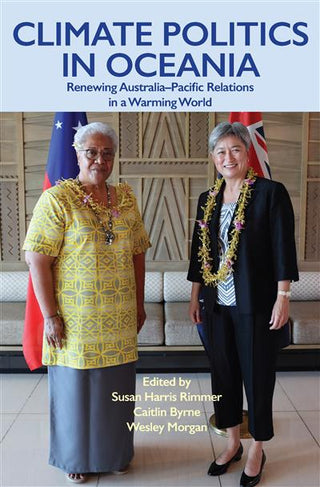Climate Politics in Oceania : Renewing Australia-Pacific Relations in a Warming World
- Unit price
- / per
-
Author:BYRNE Caitlin / HARRIS RIMMER Susan / MORGAN
-
ISBN:9780522879506
-
Publication Date:February 2024
-
Edition:1
-
Pages:256
-
Binding:Paperback
-
Publisher:Melbourne University Press
-
Country of Publication:Australia


A Back Order button means that we don’t have the book in stock at our store. It may already be on order – or we can order it for you from a publisher or distributor at no additional cost.
As we source items from around the globe, a back-order can take anywhere from 5 days to several weeks to arrive, depending on the title.
To check how long this might take, you’re welcome to contact us and we can provide an ETA or any other information you need. We recommend checking the timeframe before committing to an online order.
Climate Politics in Oceania : Renewing Australia-Pacific Relations in a Warming World
- Unit price
- / per
-
Author:BYRNE Caitlin / HARRIS RIMMER Susan / MORGAN
-
ISBN:9780522879506
-
Publication Date:February 2024
-
Edition:1
-
Pages:256
-
Binding:Paperback
-
Publisher:Melbourne University Press
-
Country of Publication:Australia
Description
A wake-up call to Australia and its climate credentials in our region
Australia's ambitions for global climate policy leadership have been seriously undermined in recent years, its reputation reduced by political inertia, policy blind spots and diplomatic isolation. At the same time, Pacific Island nations have gained global traction, their leaders recognising the influence of their regional voice and collective action in the drive to shape international law. These nations have called out Australia's poor performance and questioned its credibility within the Pacific family. The climate crisis now demands a new approach to regional cooperation in Oceania, and a fundamental re-ordering of strategic priorities. It may also require a new set of diplomatic skills and tradecraft. Until Australia demonstrates that it is serious about tackling the climate crisis, it will struggle to pursue strategic interests in the Pacific.
Bringing together diverse Australian and Pacific Island voices and perspectives, Climate Politics in Oceania reflects on the shifting debates, and highlights the potential for Australia to engage constructively with regional partners to secure Oceania's interests now and in the future. Canberra must embrace the opportunity while it still can.
Adding product to your cart
You may also like
A Back Order button means that we don’t have the book in stock at our store. It may already be on order – or we can order it for you from a publisher or distributor at no additional cost.
As we source items from around the globe, a back-order can take anywhere from 5 days to several weeks to arrive, depending on the title.
To check how long this might take, you’re welcome to contact us and we can provide an ETA or any other information you need. We recommend checking the timeframe before committing to an online order.
You may also like
You may also like
-
A wake-up call to Australia and its climate credentials in our region
Australia's ambitions for global climate policy leadership have been seriously undermined in recent years, its reputation reduced by political inertia, policy blind spots and diplomatic isolation. At the same time, Pacific Island nations have gained global traction, their leaders recognising the influence of their regional voice and collective action in the drive to shape international law. These nations have called out Australia's poor performance and questioned its credibility within the Pacific family. The climate crisis now demands a new approach to regional cooperation in Oceania, and a fundamental re-ordering of strategic priorities. It may also require a new set of diplomatic skills and tradecraft. Until Australia demonstrates that it is serious about tackling the climate crisis, it will struggle to pursue strategic interests in the Pacific.
Bringing together diverse Australian and Pacific Island voices and perspectives, Climate Politics in Oceania reflects on the shifting debates, and highlights the potential for Australia to engage constructively with regional partners to secure Oceania's interests now and in the future. Canberra must embrace the opportunity while it still can.
-
-
Author: BYRNE Caitlin / HARRIS RIMMER Susan / MORGANISBN: 9780522879506Publication Date: February 2024Edition: 1Pages: 256Binding: PaperbackPublisher: Melbourne University PressCountry of Publication: Australia
A wake-up call to Australia and its climate credentials in our region
Australia's ambitions for global climate policy leadership have been seriously undermined in recent years, its reputation reduced by political inertia, policy blind spots and diplomatic isolation. At the same time, Pacific Island nations have gained global traction, their leaders recognising the influence of their regional voice and collective action in the drive to shape international law. These nations have called out Australia's poor performance and questioned its credibility within the Pacific family. The climate crisis now demands a new approach to regional cooperation in Oceania, and a fundamental re-ordering of strategic priorities. It may also require a new set of diplomatic skills and tradecraft. Until Australia demonstrates that it is serious about tackling the climate crisis, it will struggle to pursue strategic interests in the Pacific.
Bringing together diverse Australian and Pacific Island voices and perspectives, Climate Politics in Oceania reflects on the shifting debates, and highlights the potential for Australia to engage constructively with regional partners to secure Oceania's interests now and in the future. Canberra must embrace the opportunity while it still can.
-
Author: BYRNE Caitlin / HARRIS RIMMER Susan / MORGANISBN: 9780522879506Publication Date: February 2024Edition: 1Pages: 256Binding: PaperbackPublisher: Melbourne University PressCountry of Publication: Australia
-



